Ewan McGregor Doctor Sleep
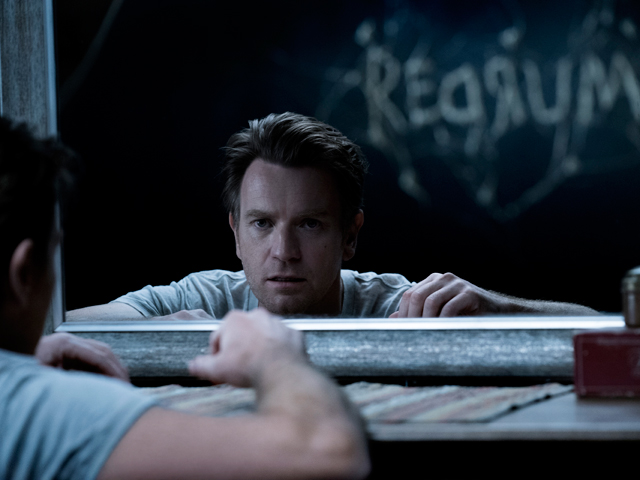
Dare To Go Back
Cast: Ewan McGregor, Rebecca Ferguson, Jacob Tremblay
Director: Mike Flanagan
Genre: Horror
Rated: MA
Running Time: 152 minutes
Synopsis: "Stephen King's Doctor Sleep" continues the story of Danny Torrance, 40 years after his terrifying stay at the Overlook Hotel in The Shining. Ewan McGregor, Rebecca Ferguson and newcomer Kyliegh Curran star in this fall's major horror event, directed by Mike Flanagan, from his own screenplay based upon the novel by Stephen King.
Still irrevocably scarred by the trauma he endured as a child at the Overlook, Dan Torrance has fought to find some semblance of peace. But that peace is shattered when he encounters Abra, a courageous teenager with her own powerful extrasensory gift, known as the "shine." Instinctively recognising that Dan shares her power, Abra has sought him out, desperate for his help against the merciless Rose the Hat and her followers, the True Knot, who feed off the shine of innocents in their quest for immortality.
Forming an unlikely alliance, Dan and Abra engage in a brutal life-or-death battle with Rose. Abra's innocence and fearless embrace of her shine compel Dan to call upon his own powers as never before"daring to go back and face his fears, while reawakening the ghosts of the past.
Doctor Sleep
Release Date: November 7th, 2019
About The Production
DAN
I know what scared feels like. But tell you what, maybe it's what you said. Just going to sleep. Nothing to be scared of, sleeping. Maybe you wake up in some better place.
PATIENT
You're a strange type of doctor.
DAN
I'm not a doctor.
PATIENT
I think y'are. Doctor Sleep.
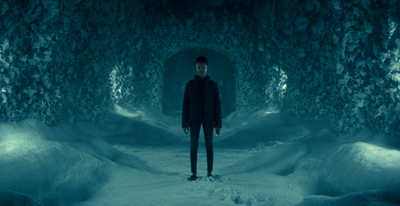 Rarely has a tale of family dysfunction entered the modern consciousness as shockingly or as completely as that of the Torrances, the father, mother and son at the center of Stephen King's third novel, The Shining. Originally published in 1977, the book went on to sell more than a million copies. Inspired by the author's personal struggles, along with a fateful night King spent in room 217 of the Stanley Hotel in Colorado, the story of Jack, Wendy and Danny Torrance is one of King's most personal works"terrifying not because of the monsters that live alongside us, but for the real-life demons that dwell within all of us.
Rarely has a tale of family dysfunction entered the modern consciousness as shockingly or as completely as that of the Torrances, the father, mother and son at the center of Stephen King's third novel, The Shining. Originally published in 1977, the book went on to sell more than a million copies. Inspired by the author's personal struggles, along with a fateful night King spent in room 217 of the Stanley Hotel in Colorado, the story of Jack, Wendy and Danny Torrance is one of King's most personal works"terrifying not because of the monsters that live alongside us, but for the real-life demons that dwell within all of us.
Thirty-six years later, King published his follow-up novel, Doctor Sleep, the continuation of the story of Dan Torrance. Although both are studies in horror and suspense, The Shining takes readers on a journey through the darkness of addiction, while Doctor Sleep brings them back to the light through recovery, self-sacrifice and redemption.
Stanley Kubrick's 1980 cinematic adaptation of The Shining is widely regarded as one of the greatest horror films of all time. It is also one of the more infamous cases of the gulf between an author's words and a filmmaker's vision, with Kubrick's film taking creative license with various elements of the story, including the fate of the Overlook Hotel, along with aspects of the character Jack Torrance. However, the reality is that both King's and Kubrick's versions of Jack's ultimate loss of self and sanity to addiction have solidified both men's places as creative geniuses.
Filmmaker Mike Flanagan has been a self-proclaimed fan(atic) of King's work since fifth grade, when he picked up his first book by the author. Flanagan says, "I was way too young, but boy did I start reading them. Those books frightened me like I've never been scared before and completely changed the way that I look at the world. That started this experience tha t I've had with so much of King's writing: as a very scared kid, reading his work taught me how to be brave in short bursts. It became an exercise in character. I became a constant reader and struggled my way, somehow, into a career where people pay me to make movies, which is still crazy to me."
The filmmaker also remembers, years later, being at the bookstore to get his copy of Doctor Sleep the first day that the novel was available: "To pick up the story specifically from King's point-of-view and jettison what Kubrick had changed in the movie about the Torrance family history…it was a fascinating tug-of-war as a reader. What Kubrick did with the material has become so iconic"so burrowed into pop culture and my mind as a cinephile"and to read this story that actively ignored that and took you in a whole other direction was exciting.
"Doctor Sleep brought back a lot of the themes from the novel of The Shining that didn't make it into the film," Flanagan continues, "specifically the focus on addiction to the degree that King took it, along with the notes of redemption. My initial impression was, 'I love this story.' I loved the three characters, Dan, Abra and Rose the Hat. I loved the contradictions between The Shining and Doctor Sleep: addiction and recovery; encroaching ice and fire. He took so many wonderful elements from the first book and let them grow into something entirely new.
"There's a part of me that insists that King's work be adapted in a faithful way," Flanagan emphasizes, "and a part that idolises the Kubrick film. Those two sides of me were at war when I began this project. But trying to satisfy both of them, I figured if I could do it for myself, then I could hopefully do it for audiences."
Reconciling such disparate sources was about "learning how to walk the tightrope between Kubrick and King. To honor both, and create a stand-alone film, was the priority from the start," he adds. 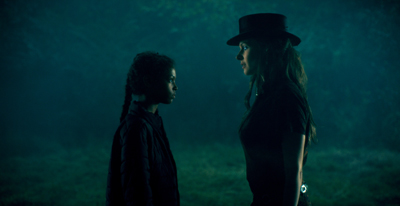 Flanagan knew that there was one vital step imperative to the livelihood of the project, the go-ahead that mattered most: Stephen King. The horror master was initially skeptical. But once the filmmaker was able to fully present his audacious take on the project, blending the published word with the cinematic legacy"in essence, giving King the resolution he felt was missing from Kubrick's vision"the author enthusiastically signed on.
Flanagan knew that there was one vital step imperative to the livelihood of the project, the go-ahead that mattered most: Stephen King. The horror master was initially skeptical. But once the filmmaker was able to fully present his audacious take on the project, blending the published word with the cinematic legacy"in essence, giving King the resolution he felt was missing from Kubrick's vision"the author enthusiastically signed on.
Stephen King says, "I always tell people the difference between Stanley Kubrick's movie and my book is his movie ended in ice and my book ended in fire. But, by taking Dan Torrance's story as a grown-up and filtering it through his own, apparently large heart, Mike has been able to take the Kubrick movie a step further, so that it warms things up. Mike's film does two things. It is a fine adaptation of Doctor Sleep, but it is also a terrific sequel to Stanley Kubrick's movie 'The Shining.' Mike has worked in a universe where some of the things that happened in 'The Shining' movie didn't happen in my book…and has somehow been able to make it work."
Assembling the Team
Producer Trevor Macy's unique creative partnership with writer-director Mike Flanagan, through their Intrepid Pictures banner, has generated a string of increasingly highprofile critical and commercial successes over the past decade, including the series "The Haunting of Hill House." Macy admits he initially required a bit of convincing when it came to "Doctor Sleep," recalling, "My first instinct was, 'Should we do a follow-up to "The Shining"?' My second was immediately, 'Well, Stephen King went there,' so that meant there was a road map. But the trick in doing it was, there's a literary universe in which The Shining ended in a certain way. Then, there's a cinematic universe in which it ended in a different way. Mike has a deep reverence for both, and so do I. Our job was to marry the two in a way that is satisfying to lovers of King and lovers of Kubrick…and still, a lot of fun."
Producer Jon Berg's first meeting with Flanagan did not go as either expected. Flanagan was called in for a possible collaboration on another property, when the discussion turned to King. "We started talking about our mutual admiration of Stephen King and it quickly turned to Doctor Sleep. I asked him what he thought about the book and how he would go about reconciling King's book, Kubrick's film and King's sequel. Turns out, he had been giving it a huge amount of thought and had an incredible point-of-view. Mike is such a talented writer/director, an extraordinary filmmaker. He's reverential of both King and Kubrick, and his take was a unique narrative that threaded the middle."
The monumental nature of the sources"the "legendary" factor"of Flanagan's "Doctor Sleep" was a large factor for the lead performers. The dual namedrops were a common motivation for each to overcome their initial reluctance to signing on to a horror/suspense film. Ewan McGregor relates, "'The Shining' was talked about as being the scariest film in the world. As a result, I didn't watch it until I was in my late teens…and I only saw it once, because it scared the s**t out of me. I'm not really into scary films"I don't like putting myself through that. But I liked the novel Doctor Sleep very much, which I read after the script. Then, I went back and read The Shining, which I enjoyed as well. Perhaps even more than the source material, it was Danny's story that really interested me. It is just amazing for an actor have all of this backstory."
Rebecca Ferguson remarks, "When I was offered this role…well, I have never really liked scary. I can't tolerate things that scare me. I hate clowns. I hate evil children in scary movies. Those two little girls, just standing there, saying their little sentence in unison, in that horrific environment…it's just eerie. I am also always interested in throwing myself into genres that I question. But really, it's bloody Stephen King and this fantastic character, all in Mike's hands. This film has been one of the most incredible productions I've been a part of. We fight through physical and non-physical worlds, and one of the most interesting aspects of 'Doctor Sleep' is when they merge. It was fantastic to be involved."
Newcomer Kyliegh Curran admits, "I knew of Stephen King; I mean, I'd heard of him. Before we started filming, I got a free pass to see a horror movie from my mother, so I watched 'The Shining.' It was scary and suspenseful. Having that reference was good for helping with my character and getting a grip on the trauma that Danny went through..it made me really feel for him."
And that is exactly the way Stephen King wants it: "I am always glad when I get an emotional reaction. That is one of the things that I care about: I want you to care. I want to move you emotionally. Horror is only one string on the guitar, if you will. There are a lot of other things as well. I want readers to see people whom they can relate to as human beings. People who are friends, people who are caregivers, people who are protectors. And that is, to a large extent, what makes the scary parts scarier."
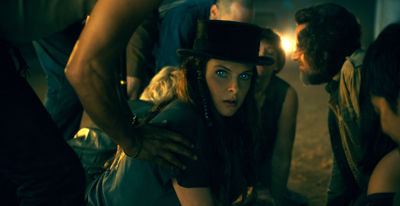 Some Shine, Some Don't
Some Shine, Some Don't Without question, Danny Torrance is a character both moviegoers and readers have cared about. He is subjected to unspeakable trauma as a child, nearly all of it at the hands of his father, Jack. To shut down his pain, he follows in the same toxic and alcoholic tendencies as Jack Torrance, nearly destroying himself just to get the memories and his shine to stop. After hitting rock bottom with a resounding thud, he runs as far as he can with the money remaining in his pocket. Then, in Frazier, New Hampshire, his real journey begins.
Flanagan observes, "Dan suffers from the same problems his father did"full-blown alcoholism plus drug use and a propensity for violence. The traits that made Jack such easy prey for the Overlook Hotel, Dan's inherited, and they define his life."
Ewan McGregor considers, "Having gone through this terrible experience, how does Danny carry on? How does he deal with his shine and deal with the fact that he's different? He deals by drinking, like his father did, to the point where he can't drink anymore. That was a very interesting prospect for me, to play somebody at that low curve of his soul. Then, also like his father, Danny gets sober; Jack did the same a few months before he took the job at the Overlook."
Flanagan continues, "This is someone we can understand. He's a flawed person who deals with his own demons, his strengths, his weaknesses, and who is pulled into a story much bigger than he is. That meant we needed an actor who is inherently relatable. Ewan brings such a wounded humanity to Dan. My favorite work of his are the scenes where he's with the patients in the hospice"beautiful and humble. I think that's the thing I associate with him, the humility of Ewan…and from a movie star who's been in some of the biggest films ever made!"
Finding a safe and welcoming community in the local AA chapter, Danny is led to a post for which he is uniquely suited. McGregor says, "Danny has always taken jobs in hospitals or senior homes. With his transient, alcoholic life, it's something that doesn't tie him down, plus he's good at it. Once he gets sober, he starts working at a hospice, where he discovers that he's helpful to patients as they near death. In talking them through the process, saying that it's like falling into a wonderful sleep, he helps them cross over. That's all of his shine that he will allow himself to use. That's also how he gets the nickname Doctor Sleep."
Berg adds, "He's tried everything to numb his shine. He sees ghosts from the Overlook, he can hear people's thoughts. He later admits that he saw death flies on his mother's face as she succumbed to cancer. They became so thick that he couldn't look her in the eyes toward the end of her life. That's an unfathomable amount of pain to carry around."
Flanagan offers, "Dan's shine has always tortured him, shown him visions of blood and murder. It's made him vulnerable, the target of horrible things. And now, because of it, he can look at someone who's about to die and know exactly what they need to be comforted. It completely recontextualizes this ability and gives his life and his shine a purpose for the first time. And in the novel that, for me, was when Dan Torrance really emerged as the hero of the story."
Dan's story is a resonant one for King. He admits, "When I wrote Doctor Sleep, I had been sober for a long time. I wanted to write Dan's story from that perspective because…well, I won't say that I was two different people, because that would be overstating the case. But I was considerably different and in a different place than the guy who wrote The Shining. That was one of the impelling forces behind writing the book"I felt like I had a more global view of this particular character. But the other thing I didn't want to do was turn it into a tract, a moral statement about drinking or not drinking. My aim was to present this character and the reader, or the viewer, can make their own decisions based on what happened."
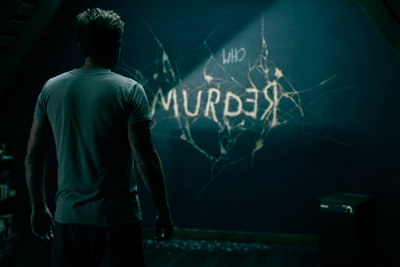 For such a warm, albeit flawed, anchoring character as Dan Torrance, King countered him with, as Flanagan puts it, "one of the best Stephen King antagonists in many, many years, Rose the Hat. Unlike Dan, she's very difficult to relate to practically. There's nothing about her experience"having been alive for so long and doing the horrible things that she does"you can grab onto. She is larger-than-life in every way."
For such a warm, albeit flawed, anchoring character as Dan Torrance, King countered him with, as Flanagan puts it, "one of the best Stephen King antagonists in many, many years, Rose the Hat. Unlike Dan, she's very difficult to relate to practically. There's nothing about her experience"having been alive for so long and doing the horrible things that she does"you can grab onto. She is larger-than-life in every way." Rose leads the quasi-immortal cult known as the True Knot, who have powered their elongated lives by victimizing children with the shine""steam" as it emerges from their bodies"which is devoured by Rose and her followers. The former humans continue to move through existence, unnoticed, imitating humans, predators mimicking prey. However, the modern world"with its diversions, complications and shortcuts to adulthood"has dulled children's shine, leaving the True Knot with fewer substantial sources of sustenance. For the first time in eons, they are hungry and their future is in question.
Macy explains, "They've been around as long as humanity has been around, as long as kids with shine have been around. They're ancient, incredibly tight-knit and live by blending in. They are everywhere and have an endless capacity for evil. That is what makes them so incredibly dangerous."
Such a complex and dichotomous character made her casting a challenge. Flanagan observes, "Rose the Hat is monstrous in a way that a lot of King's villains never come close to. But there's also something about her that's magnetic, confident and very charming. There's a wicked delight in living as long as she has without consequence. What would that look like?"
After Rebecca Ferguson's name entered discussions, Flanagan and Macy met her via Skype. The writer/director states, "We laughed so hard that Trevor and I both were kind of in pain by the end. Rebecca's one of the most charming people I've ever met. And she understood what makes a great villain. It's that you need them to be liked. You want them to be feared, but you also need them to be liked. For Rose the Hat, we wanted somebody who had the things that Rebecca brings seemingly effortlessly to screen. Rose is beautiful, seductive and beguiling, and that is exactly her intention. That is the power that she uses to pull you in."
Ferguson says, "After reading the script, I thought, 'This is one of the biggest challenges I will ever have if I'm offered the role.' What I really loved was pulling down the scary elements"her limitlessness for cruelty and all that makes her the monster she is"and to make her as human as possible, while making her a threat to everyone around her. All that in combination with King and Kubrick's revolution of the genre. There is no way you can say no to that."
Berg confirms, "When you discover what Rose is"dangerous, pernicious, venal, murderous"it's in opposition to what she presents. There's lightness and charisma. It's chilling. And Rebecca has this wonderful presence and she really brings it."
As an actor, Ferguson built her character from one of the most relatable scenarios in the human psyche: "The whole essence of Rose and the True Knot line, and really pretty much anyone, is love. Being a part of something. It's the primal emotions. The difference being that children are what sustain them. So, for Rose, it's about providing for my children, my flock, out of deep abiding love."
Children are the fulcrum on which the story of "Doctor Sleep" turns…children with gifts , children at risk, children trying to find their way. A young teenager named Abra could be described as fitting into all three categories at once. Flanagan asserts, "One of the coolest things about this, from a writer's point-of-view, is that this isn't one story; it's three distinct stories that converge together into a fine point. Abra has no idea that there's anything unusual about these magic powers, as she describes her shine. The two characters share one of the larger themes"that they feel a need to hide this huge part of themselves out of love for their families."
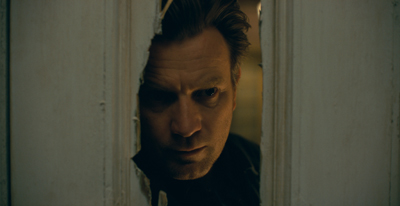 McGregor concurs, "Danny learned early to try and hide, himself and his shine. The ghosts from the Overlook followed him. Then, suppression led to drinking. So, when Abra shows up, it brings up everything about himself he's tried to bury."
McGregor concurs, "Danny learned early to try and hide, himself and his shine. The ghosts from the Overlook followed him. Then, suppression led to drinking. So, when Abra shows up, it brings up everything about himself he's tried to bury." Flanagan elaborates, "If the raging ego of Rose is the foil for the humility of Dan, then the heart of the story"and the most challenging part to cast"was Abra. This is the character to whom King is passing the mantle of The Shining. She's more powerful than Dan, and probably on par with Rose, but her power is reckless, unformed, and she doesn't understand it herself."
In the end, nearly 1,000 young actors were looked at for the part, but Kyliegh Curran, with a run in Broadway's "The Lion King" as her biggest credit at the time, won the role. Macy remarks, "Abra rushes in where angels fear to tread, but there's a shade of naiveté to her as well. The question for us was, how do we find somebody who personifies those traits in the right cocktail, and who can hold a candle to people like Ewan and Rebecca in terms of acting? Kyliegh just rose to the top."
Kyliegh Curran sees Abra as a, "strong but innocent young girl. I feel she's genuinely good. She's very outspoken and doesn't want to hide her shine"she's not like Danny"she is open about it. She doesn't see it as some sort of power, like a burden. For her, it's like a magic trick. She's a magician with a cool special trick only she knows.
She's okay with using it to save people; she'll lay down her life for someone she doesn't even know." Despite all of her strengths, there is an integral part that is missing from her upbringing. Curran says, "Her parents are scared of it, scared of her when she uses it. She tries not to, but it's such a big part of who she is. By hiding it, it really puts a dent in the relationship with her parents. She's afraid of that look on their faces"it breaks her heart. I think, when she finds Dan, he sort of fills that hole in her heart; she even calls him Uncle Danny, because of the connection she feels."
For a child with shine"having no knowledge of what it is or how to best utilize it"a mentor is the only way for them to learn how to move in the tangible world while possessing powers that touch upon the next. In The Shining Danny had Dick Hallorann to help him understand his gift, and Abra is lucky to connect with Dan. One of King's characters is not so lucky. Flanagan relates, "There is another example of mentor and gifted child in King's book, and that's Andi, whom Rose comes across in a movie theater. Most children with shine become victims of the True Knot, but occasionally, their powers are strong enough or specific enough that they are inducted into the Knot. Andi has been damaged by a predator, so she herself has been taking revenge on predators. Rose says to her, 'I see you, I understand you. I can teach you what you can do with this.' That's a powerful thing to say to someone who believes they are alone. Once Andi joins the ranks, it gives the audience a wonderful way to learn about our monsters firsthand from a character that we empathize with."
Emily Alyn Lind plays Andi, whom Rose re-christens "Snakebite Andi." Lind offers, "She's really been messed up by the men who have used her. Playing someone who is presented as a badass, but who also has this innocent side, this hurt child inside, I found really interesting. As the True Knot feed, they're no longer just themselves. When humans eat, what they take in nourishes and becomes a part of them. Taking in steam is kind of the same"those victims are now a part of us. I thought that was a really cool aspect."
The broken individuals who choose to enter recovery are also in need of guidance down the new path they have taken. Just off the bus in Frazier, Dan meets Billy Freeman, who Flanagan sees as, "a beautiful character. He represents another kind of father figure for Dan at a time when he really needs it. Billy goes out of his way to show kindness to Dan. I think a lot of us would be too nervous to extend a hand to this damaged person. Cliff Curtis plays Billy, and he's really someone who disappears into whatever role he inhabits. He brings authentic warmth and generosity. He really gives us a window into what the film is really about, which is recovery."
Curtis comments, "Billy is essential to this town. He's connected to everybody; he's someone you trust with your children. I thought it would be interesting to challenge the notion of what a good, trustworthy guy looks like. He has a history and it kind of shows in his appearance. I think the audience, along with Dan, aren't too sure about him when they meet him. He's solid, consistent, and that matters more than meeting expectations about what recovery looks like. His comfort level with himself is what puts others at ease."
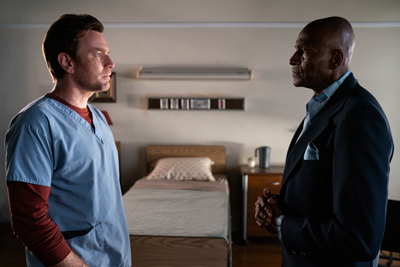 While Danny is haunted by the evil entities who first discovered him at the Overlook Hotel, he is fortuitously also visited by the kind soul who first explained his shine to him"Dick Hallorann. Carl Lumbly filled the role originally portrayed by Scatman Crothers. Lumbly admits, "Watching the film, I suppose as an actor I have two instincts. One is that I want to do justice to the character, and the other is that I want to do justice to his performance without re-creating. I worked to interpret Dick as I see him, but with an obvious homage to what Scatman did. There's a directness and a matter-of-factness. He values it in himself and in others. Ultimately, I think his heart is what defines Dick Hallorann. But with his abilities, seeing all that he sees, it's been a challenge to keep his heart open. It's what connects him to Danny. For most of Danny's life, Dick is the only person who continues to look out for him."
While Danny is haunted by the evil entities who first discovered him at the Overlook Hotel, he is fortuitously also visited by the kind soul who first explained his shine to him"Dick Hallorann. Carl Lumbly filled the role originally portrayed by Scatman Crothers. Lumbly admits, "Watching the film, I suppose as an actor I have two instincts. One is that I want to do justice to the character, and the other is that I want to do justice to his performance without re-creating. I worked to interpret Dick as I see him, but with an obvious homage to what Scatman did. There's a directness and a matter-of-factness. He values it in himself and in others. Ultimately, I think his heart is what defines Dick Hallorann. But with his abilities, seeing all that he sees, it's been a challenge to keep his heart open. It's what connects him to Danny. For most of Danny's life, Dick is the only person who continues to look out for him." Flanagan filled every part with an eye to cohesion and believability inside this filmscape of converging realms. He confirms, "I wanted actors keenly adept at finding the human connectivity in a world outside of our everyday experience. I marvel at what they brought to their roles."
Weaving Worlds Into One
Rose The Hat
Ten years from now, you're still 15. A hundred years, maybe you're 17. Live long, stay young. Eat well.
In making the bold decision to return to the unforgettable visuals of Kubrick's "The Shining," Flanagan required permission to gain entry to that world"and indeed, to the Overlook Hotel itself.
Trevor Macy explains, "The Kubrick estate was extremely generous and open with us, allowing us plans for their sets and access to original footage. This gave us the ability to go back to this touchstone in horror films."
Flanagan interjects, "We wanted to have the same Overlook, the same Room 237, but it's impossible to recreate those perfectly. Attempting to do a perfect recreation gives us an imitation instead of an homage. We wanted to honor Kubrick's work, to acknowledge it reverently, without just doing it over again. Knowing there would be differences freed us up to make our movie. It was all about striking a balance."
Flanagan assembled an artistic team from both previous collaborators, cinematographer Michael Fimognari and composers The Newton Brothers, and new associates, production designer Maher Ahmad and costume designer Terry Anderson. The filmmaker says, "I got to work with a lot of my family on this, and I say that because I've had a lot of the same crew that have worked with me since 'Oculus,' pretty much since the beginning. One of the most critical collaborators in my career is my DP, Michael Fimognari. This was the most ambitious project that we have approached together. It was about achieving the aesthetic, as well as the familiarity of the place."
The design team painstakingly dissected construction plans and footage from the original film to accomplish Team Flanagan's balancing act. Production overtook four soundstages at Atlanta's Blackhall Studios to accommodate the myriad of interior worlds traversed in the film, with crew working above and beyond to construct sets taking up more than 86,000 square feet (nearly 1½ football fields' worth). Sets that took two years to complete for The Shining were recreated for Doctor Sleep in just six weeks.
During shooting, to remain on schedule, filmmakers utilized a Russian nesting doll approach that allowed sets to live inside other sets; as soon as filming wrapped on one, a seemingly new one would pop into its place. The super-life-size puzzle of "construction and demolition" necessitated a huge amount of forethought during pre-production and coordinated effort during principal photography.
Flanagan quickly points out, "In addition to all of this, we were also building three other worlds and creating beautiful aesthetics for Dan's, Abra's and Rose's environments. Particularly Rose's world offered us some of the most intense fun we had on the project.
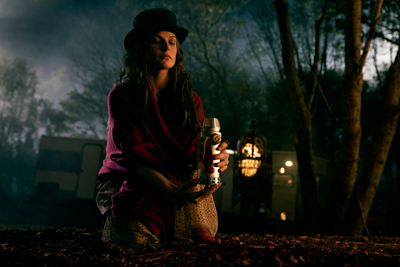 "But I have to admit," he goes on, "that something really special happened the first time that Michael and I stepped onto the Overlook sets. We're both giant nerds is really what that is about, and we have been our whole lives. We are also lovers of cinema, and walking in there, we turned into kids. Similar thing happened with Trevor"he's an extremely experienced producer, and he acted the same way setting foot in the Colorado Lounge. Once we were done with the hard work of the day, we were all taking turns, riding around the set on the big wheel."
"But I have to admit," he goes on, "that something really special happened the first time that Michael and I stepped onto the Overlook sets. We're both giant nerds is really what that is about, and we have been our whole lives. We are also lovers of cinema, and walking in there, we turned into kids. Similar thing happened with Trevor"he's an extremely experienced producer, and he acted the same way setting foot in the Colorado Lounge. Once we were done with the hard work of the day, we were all taking turns, riding around the set on the big wheel."
Ewan McGregor relates, "We used the entire Lounge, from one edge of it, up to the top of the stairs of the other. It was a very magical space to work in. But, for me, it goes back to character. I can't play a horror film; I can only play a human being. My job is to be realistic and believable, to draw from what I have experienced or use my imagination in things I have not. The creation of the amazing world around us is Mike's job, in addition to telling the story, which has been beautifully done."
Jon Berg relates, "Just sitting on the set of the Overlook Hotel, you just feel it"the presence of, maybe not ghosts, but certainly of the filmmaker that came before us. It was haunting and thrilling. A little bit of Kubrick and King, and a lot of Mike Flanagan inhabiting the place…it really came to life in a gorgeous way."
Terry Anderson, charged with building select costumes from "The Shining," as well as the wardrobe for all of the new characters, says, "Recreating things from the movie was very interesting, almost nerd-level, because once you start making pieces, you feel like you're sort of touching genius, in a way. There's a chill about it."
Flanagan continued his practice of also editing his own film on "Doctor Sleep." Rebecca Ferguson remembers, "Mike showed me his book, which is basically all of his shots. He's that bloody prepared"the angles, the shots, what he needs for editorial purposes. This might scare some actors, who could think, 'Well, what am I doing here? Where's my creative aspect in it?' Intense preparation does not curtail creativity; it firmly places you in this space to explore. Even wearing all of his caps, he has the openness to let us create something together for the character."
McGregor adds, "Mike very much knows what shots he needs to tell the story, and he has the whole movie plotted out. He's incredibly proficient at capturing what he needs to tell the story."
Certain scenes required stepped-up levels of conscientiousness on the part of the entire production. Flanagan explains, "Certainly, one of the most impactful moments of the book is the sequence with Bradley Trevor, played by Jacob Tremblay. It is a point of inflection in the story that is unspeakably visceral. His victimization by the True Knot changes everything, and it needs to. It was one of the hardest things I've had to read, and certainly one of the hardest things we've had to film."
Tremblay showed up having worked on the scene on his own. The first take landed harshly with everyone on set. Flanagan and team were astounded by what they saw in their monitors, and many of the actors and crew had to step away and just recover. Tremblay"every bit the professional, but also the 12-year-old boy"got up, dusted himself off and high-fived his father. Flanagan recalls, "He traumatized all of us so much that we knew the scene was going to work. But it was a delight to have him on set again. He was just having fun, and always came up with a smile and a laugh. That was one of the only things that made us feel okay about doing what was being done in the scene."
Ferguson comments, "Someone had asked me, 'What do you think doing that scene is going to be like?' I shrugged it off"I'm a professional, and we have a job to do. So, we hear 'Action!' I see Jacob preparing to go into a state of frenzy. He starts hyperventilating, then screaming. I can feel my lip shaking, a lump in my throat, and tears start rolling down my face. So, I'm wiping my cheeks entering the scene. I have never been so shocked by a performance. I went back to the person who had questioned me and I said, 'I was wrong.' That moment, that made me a method actor."
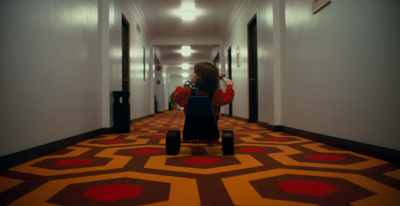 Sounds of New Terrain
Sounds of New Terrain
Matching filmscape to soundscape, Flanagan again turned to The Newton Brothers " comprised of Andy Grush and Taylor Newton Stewart"to compose the score. Flanagan observes, "One of the many things that Kubrick did to genius effect in 'The Shining' was utilize score and sound design in a way that created an impenetrable sense of dread. Even in scenes where nothing overly terrifying is happening onscreen, you feel uneasy because of what he did with sound. It was important for 'Doctor Sleep' to have our own identity, but we also wanted to call back to some of the feelings Kubrick created."
The musical duo began by considering a non-traditional approach, like the incorporation of environmental sounds and alternative instrumentation, to create the score. Stewart supplies, "There were early discussions about the use of melody and textures before any actual writing began. We wanted this to sound like nothing else."
At the beginning of each project the Newtons research instruments and sounds relevant to the story. Grush picks up, "We found an inventor/musician Paul Dresher, who built a Hurdy Grandé [a massive uniquely modified version of a hurdy-gurdy]. It produces this low moving sound that adds some depth and became one of the signature sounds for the True Knot"it harkens back to older times for these ancient travelers."
In addition, The Newtons utilized one of the world's largest aeolian wind harps, located in Northern California. The harp recordings were manipulated through modular synthesizers to play in tandem with other score elements. "Wind comes up a lot in the imagery in King's book," they note.
The composers were actually alerted to a unique meteorological wind event in San Francisco, and with a day's notice, set up their equipment to record fluctuating movement of the air. They also worked to utilize rare percussive instruments from different cultures within the score, adding color and sonic interest.
Stewart summarizes, "Working with Mike is a unique composing process. He allows us time and space to let the story, or the characters, breathe, rather than just trying to fill the film with music. He also provides multiple opportunities to let us shine. This genre can just be about jump scares, but Mike's work is full of emotion, and we capitalized on that."
Grush adds, "There's a broader dynamic to his films. You can have moments of chaos and horror, alongside moments of quiet and beauty. His work really mirrors life. It's not just genre, it's complex."
It is the complexity of life that defies categorization that drew the young Mike Flanagan to the works of Stephen King. Flanagan affirms, "King has always been wonderful at telling stories about people who are different and people who feel alone because they're different. Ultimately, they just want to be understood and seen. It's that particular side of ourselves that is defining"whether we hide it or present it"and putting it out in the world is scary. That's a horror we all learn very young, and King taps into that in a profound way."
Stephen King elaborates, "If you like to draw, you don't have to hide them, you can actually show those pictures. If you like to write, you can show your work to others. You can be brave about it. The worst that can happen is somebody says, 'I don't like it,' and that is not exactly the worst thing in the world…it is not like a poke in the eye with a sharp stick."
Mike Flanagan closes, "I hope that theme carries through in this film, because there is a key moment where Dan gives a piece of advice to Abra…similar advice that he got from Dick Hallorann. Dan says, 'When I first met you, I told you, you should hide, keep your head down. Keep your shine out of sight. I was wrong about that.' In essence, as scary as the world is, a s unfair as it can be, as horrific as it can be, you need to shine on. Let it out, because there are others just like you, and that's what we need to make the world less terrifying, to balance things. I think that encapsulates the entire purpose of King's story. 'Shine on.'"
Doctor Sleep
Release Date: November 7th, 2019
MORE



